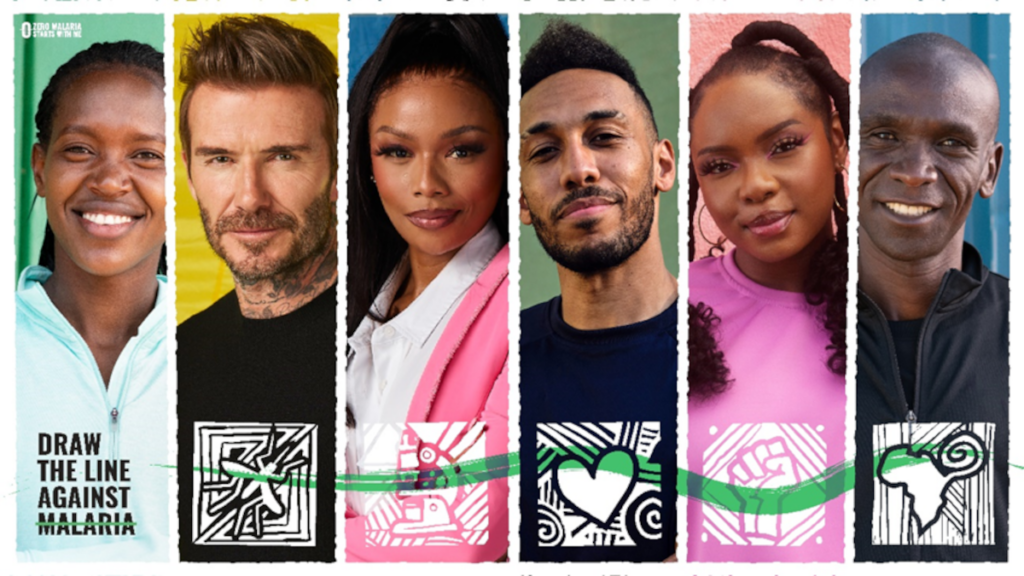DAVID Beckham is one of the names in a range of stars joining forces to up the pressure in the fight against malaria.
The former footballing ace is one of a host of names launching the second chapter of the Draw the Line Against Malaria campaign.
This next chapter of the campaign aims to turn up the pressure on world leaders to commit to ending malaria at the Kigali Summit on Malaria & NTDs in June and investing funds totalling $18bn at the Global Fund’s Seventh Repleishment in New York this autumn.
A fully replenished Global Fund is projected to help reduce malaria deaths by 62%, treat 550m malaria cases, and eliminate malaria from six more countries by 2026.

Backed by the RBM Partnership to End Malaria, the second phase of Draw The Line is fronted by Malaria No More UK Leadership Council founding member Beckham and FC Barcelona striker Pierre-Emerick Aubameyang, to marathon world record-holder Eliud Kipchoge and Afropop singer Yemi Alade.
Dr Tedros Adhanom Ghebreyesus, WHO Director-General said: “The World Health Organization welcomes a new host of scientists, youth, and champions to join the malaria fight at a crucial time when progress against the disease is lagging.
“Draw The Line provides a platform for Africa’s most powerful narrators to change this trajectory, disrupt political apathy, and lead the fight to end this treatable and preventable disease which kills a child nearly every minute.”
Dr Corine Karema, Interim CEO of the RBM Partnership to End Malaria says: “In addition to the innovation of new tools, we must invest in the country health systems and programmes needed to ensure these tools and resources target the right people and right places, at the right time.
“The Global Fund plays a critical role in delivering lifesaving malaria services where they are needed most.
“This year, it is vital that we see a fully replenished Global Fund to get back on track and accelerate the malaria response to end this disease and strengthen health systems, creating a safer, healthier and more equal world for all.”
David Beckham said: “I have supported the fight against malaria for many years and am proud to be a part of this amazing campaign, alongside many inspiring artists, athletes and champions from across Africa.
“This is a year of big opportunity and there is a way of curing this disease.
“World leaders have the power and responsibility to make change and create a safer, healthier, fairer world for all.”
A fast-paced new Draw The Line film, directed by Grammy-winning Meji Alabi, builds on the ground breaking momentum of the first phase of the campaign, highlighting the fight against malaria.
The short film will be showcased at the Paramount/MTV Africa Day Concert on 28th May 2022 in Johannesburg.
This is ahead of the Kigali Summit on Malaria and Neglected Tropical Diseases being held on the eve of the Commonwealth Heads of Government Meeting (CHOGM) in Rwanda on 23rd June.
The Summit is a milestone moment in the malaria fight and enabler of political decisions including delivering on the commitment to halve malaria across the Commonwealth by 2023 and accelerate global efforts to cut malaria by 90% by 2030.
Pierre-Emerick Aubameyang says: “I am proud to be a voice for this campaign at such a significant time with big decisions ahead.
“I caught malaria in 2021 when playing for the national team in Gabon where 100% of the population is at risk from malaria.
“It was a tough time, I was lucky to be able to get to a doctor, in time to make a full recovery, but so many people don’t have access to essential medical care, especially children.
“As a dad I find it totally unacceptable that malaria takes the life of a child every minute when it can be prevented, treated and cured.”
The latest World Malaria Report figures show that disruption caused by the COVID-19 pandemic contributed to an additional 47,000 malaria deaths between 2019 and 2020, with a total of 627,000 lives lost to malaria in 2020 – the highest number in nearly a decade.
Children are especially vulnerable, accounting for 80% of malaria deaths in sub-Saharan Africa, with around 481,500 losing their lives across the Continent.
The increases in malaria cases and deaths seen in 2020 come on the back of years of plateaued funding, which has been compounded by emerging threats from the natural world, such as growing drug and insecticide resistance.
This is in addition to disruption to malaria prevention and treatment services caused by the COVID-19 pandemic and other humanitarian emergencies.
The latest figures suggest that malaria places an even greater burden on fragile health systems than previously thought, reducing their ability to identify emerging diseases.
Investments to end malaria can act as a pathfinder for pandemic preparedness and response, helping build resilient and sustainable health systems and strengthening country capacity to be prepared for future threats.
